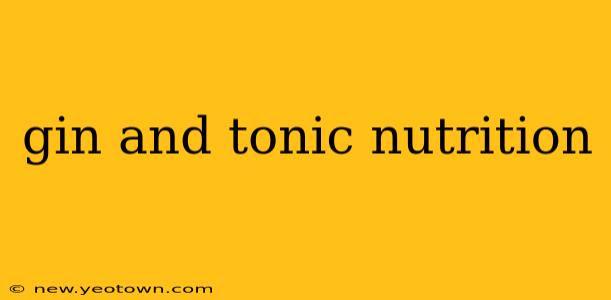The quintessential summer drink, the gin and tonic, conjures images of sunshine, relaxation, and good company. But beyond its refreshing taste, what's actually in that glass? Let's delve into the nutritional profile of this classic cocktail and uncover some surprising facts. This isn't about advocating for excessive alcohol consumption, but rather providing a balanced look at the nutritional aspects of a gin and tonic enjoyed responsibly.
What are the calories in a gin and tonic?
The calorie count of a gin and tonic can vary significantly depending on several factors. The primary contributors are the gin itself, the tonic water, and any added ingredients like lime or fruit. A standard gin and tonic (using a 1.5 oz measure of gin and 4 oz of tonic) typically falls within the 150-200 calorie range. However, premium gins, larger pours, and sugary additions like fruit juices or syrups can dramatically increase this number. Choosing a diet tonic can significantly reduce the calories, bringing the count down closer to 100.
What are the ingredients in gin and tonic?
At its core, a gin and tonic is a simple combination of two key ingredients:
-
Gin: This distilled spirit is primarily made from juniper berries, giving it its distinctive flavour. Other botanicals are often included, such as citrus peels, coriander, and angelica root. Different gins will have varying flavor profiles and sometimes even added sugars.
-
Tonic Water: This carbonated beverage is characterized by its bitter, slightly sweet taste, primarily derived from quinine. Quinine is a naturally occurring compound with antimalarial properties, though the amount in tonic water is far too small to have any significant medicinal effect. Many tonic waters contain added sugar, high fructose corn syrup, or artificial sweeteners.
Does tonic water have sugar?
This is a crucial point to consider. Many commercial tonic waters contain a substantial amount of added sugar. Checking the nutrition label is vital. Opting for a diet tonic water or a tonic water with natural sweeteners significantly reduces the sugar content and overall calorie count of your drink.
Is gin and tonic good for you?
It's important to be realistic. Gin and tonic, like most alcoholic beverages, isn't a health food. However, consumed in moderation, some potential benefits could be considered:
- Moderate antioxidant properties (from botanicals in gin): Some studies suggest that certain botanicals in gin possess antioxidant properties, but the quantity in a single serving is minimal.
- Potential hydration (from tonic water): The water content of the drink contributes to your daily fluid intake, especially if you're well-hydrated already. This benefit is negated by the dehydrating effects of alcohol however.
What are the health risks of gin and tonic?
The primary health concerns associated with gin and tonic consumption relate to the alcohol content:
- Liver damage: Excessive alcohol consumption significantly increases the risk of liver damage.
- Weight gain: The calories and sugar in many tonic waters can contribute to weight gain, especially when consumed regularly.
- Dehydration: Alcohol is a diuretic, meaning it increases urination and can lead to dehydration.
How many gin and tonics can I drink before it becomes unhealthy?
There's no single answer to this question, as it depends on individual factors like body weight, metabolism, and overall health. However, adhering to recommended drinking guidelines is crucial. Excessive alcohol consumption is linked to various health problems. Moderation is key.
Conclusion: Enjoy Responsibly
The gin and tonic, while enjoyable, isn't a health elixir. Understanding its nutritional content – particularly the sugar and calorie counts – allows for informed choices. By opting for diet tonic, using moderate gin pours, and being mindful of your overall intake, you can enjoy this classic cocktail responsibly, minimizing any potential health risks. Remember, moderation and awareness are essential.

